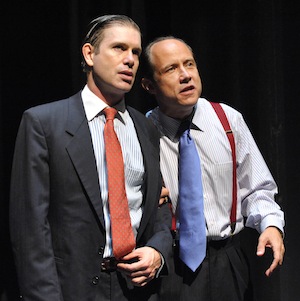"Serious Money" Is a Serious Attack on World Finances
Serious Money
Atlantic Stage 2
330 W. 16th Street
New York, NY

Groups of reckless young stock wizards raid large corporations, take them over and fire hundreds of long time workers. Bank executives ruin their banks by making reckless loans to shadowy business people from all over the globe. A country is nearly ruined by financial chicanery. Government agencies trusted to oversee all of these people sit back and do nothing.
Does this sound familiar?
Serious Money, by British playwright Caryl Churchill, which opened last week at Atlantic Stage 2 in New York, could have been written last night about the U.S. financial catastrophe. It wasn’t, though. It was written in 1987 and chronicled financial woes in England. What is astounding about the play is that in the twenty-five years since it was first produced, no one learned anything from it.
It is a nicely acted and smoothly produced show, its freneticism and energy hurricanes reined in adroitly by director Cheryl Faraone. Serious Money is not only good drama, with a lot of scathing humor, but a good look at financial history over nearly three decades -- a sad look.
The plot of the play is simple. A fabulously wealthy stock czar, the rather frantic Billy Corman, wants to take over a large company, Albion, and tries to get other financial moguls to come in on the deal as his partners. These include an arrogant American, Marylou Baines, and a sexy South American, Jacinta Condor. They are aided by a fast talking, soulless young American banker, Zac Zackerman. There is a tiny subplot about a trader’s brother being murdered, but that goes nowhere.
All everybody in the story wants to do is make a lot of money, and they don’t care how they do it or who it hurts, or how many people it hurts. The cast sings a wonderful song about greed being healthy and good for all. Writer Churchill does fine work in showing that these people all live in a financial subculture, disconnected from the real world. They live and die on the ups and downs of the Dow Jones Industrial Average. They mock the people that buy their stocks and the people who run the companies they seize. They are immoral to the core and hold up as their heroes people who are far more immoral than they are.
The play is an attempt to explain not just the cutthroat financial world of the 1980s, but how the recession of 2008 started. It does -- a little.
As you sit there and watch the very engaging play, you keep thinking about the Oliver Stone movie, Wall Street, and Michael Douglas as the unforgettable financial snake, Gordon (“greed is good”) Gekko. That film, like Serious Money, was a smartly produced vignette about corporate greed.
Some of the actors in Serious Money have trouble play multiple roles, but all of them are good, led by Ales Draper as Billy Corman, David Barlow as Zac Zackerman, Jeanne LaSala Taylor as Jacinta Condor, Megan Byrne as Marylou Baines, and Tara Giordano as Scilla Todd. Their characters mingle among a choir or unethical stock people, whom Churchill describes nicely.
The play has some serious drawbacks. The doubling up of actors is at times confusing. Draper, as Corman, plays another minor character, and the transition does not go well. The others get lost in their second characters. The government is not involved in this play until the last half hour, leading you to believe that the government knew nothing about what had been going on, or those practices. If it did, that should be shown, and if government officials had no idea, that should have been shown, too, because government incompetence is what helped to nearly ruin America in 2008. There also needs to be some sort of context for the play and a little talk about how all of these financial wheelings and dealings were seen by reputable people, in and out of the financial world. The play also needs to be a bit simpler. Short of nuclear fission, there is nothing as complicated as world finance. People got a little lost trying to follow the financial dickering in the story. It needs a plainer presentation.
Despite its drawbacks, Churchill’s play is solid and sinister look at the financial world in Great Britain, and in the U.S. too. It helps to explain why the unchecked practices of stock brokers and bankers brought about trouble in England in the early 1980s and near ruin there, and all over the world, in 2008. It is not comprehensive history, but a pretty good look at life at the top of the financial world.
Much applause goes to the producers. In the play’s program they give theatergoers a nice synopsis of the financial crisis in England in the 1980s, the goals of Thatcher’s government and a reminder that what happened then just happened here in the U.S. They also published a long list of financial terms to help members of the audience understand what is going on (I finally learned that Arbitrage is not the capital of Alaska).
Although, when you think about it, nobody really did know what was going on in financial markets in the 1980s or in 2008, did they?
PRODUCTION: Sets: Hallie Zieselman, Lighting: Mark Evancho, Costumes: Jule Emerson and Jordan Ashleigh Jones, Sound: Allison Rimmer with Aubrey Dube.
